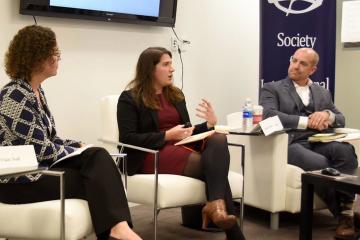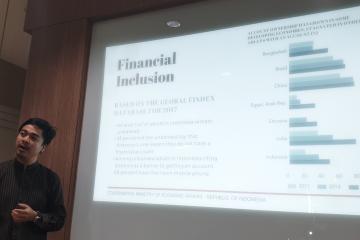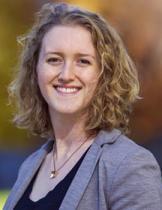
Adrien Bouguen, J-PAL ‘12, on his path from research assistant to assistant professor

The Alumni Spotlight series highlights J-PAL alumni who are making an impact across industries and around the world. To nominate a J-PAL alum to be featured in a future Alumni Spotlight, please fill out this form.
Adrien Bouguen joined J-PAL Europe as a research assistant in 2009, where he played a central role in establishing our then-fledgling European office. Now an assistant professor of economics at Santa Clara University, his research focuses on the economics of education and child development. He joined us to talk about his time at J-PAL and his growth as a researcher.
Could you tell us a bit about what led you to J-PAL?
Back in 2008, when I was getting my Master’s in education, I had a couple of great professors who were focused on studying the role of non-cognitive skills on life outcomes. I became really excited about this topic and knew I wanted to get serious about it.
As I was applying for my PhD to continue working on education, I saw an ad for a job in Paris to assist in an exciting new form of education policy research. I thought, great, this is exactly what I want to do. So I decided to delay my PhD for this opportunity. I moved back to France and I started working with J-PAL affiliates Marc Gurgand, Luc Behaghel, and Clément de Chaisemartin.
I really loved being a research assistant. During my first year, I worked on data collection for an evaluation of France’s “Boarding Schools of Excellence,” which was a very well-funded national program that places disadvantaged students in boarding schools to provide them with better learning environments.
I was able to constantly interact with researchers while working in the field, and found that I came to better understand my own education system as well. The first year was a lot of hard work, but very worthwhile. I ended up staying for two or three years before moving on to the Paris School of Economics to get my PhD.
Could you expand on what it was like to be at J-PAL Europe when it was just getting off the ground?
We were practically sleeping there! There were around eight of us or so, we were all around 25 years old, and we were so excited to be building an entire office from scratch. Randomized evaluations were almost unheard of in France at the time, so collecting data was new and asking for access to administrative data was not something that people were used to, so we had to do a lot of convincing. The structure for J-PAL Europe was gradually built up and it became more professional, but at the time it really felt like a startup.
Sounds like you were incredibly busy all day long—can you tell us a bit more about what your day to day was like as a research assistant? How has that changed now that you are a Primary Investigator (PI)?
There were a lot of things that I had to learn on the job. Back then we didn’t have tablets for surveys and the Internet wasn’t used as much, so we had to print questionnaires. We had walls of questionnaire packets—one per student— that we sent to schools, and then over the summer we had around twenty people inputting data all day long. At the beginning I wasn’t doing much analysis, but as I built up my skills, the PIs began to trust me more and I began to help out on other things. Some research assistants only stay at J-PAL for a year, but I appreciated spending more time there to really build skills I needed later on.
As a research assistant, a large part of the job is managing data: collecting the data, making sure that it was done correctly, inputting the data, putting the database together on Stata, coding, cleaning, etc.
Now, as a PI, it’s more about supervising. I have weekly calls with my research assistants and research managers where I give them directions on what to do or what to look into. I do a bit of analysis in Stata to help them out, but really, what I do now is look at result tables and say, okay, you need to go there. You need to check that.
As a PI, you have both decision-making power and greater responsibility. You are the one taking responsibility for where you send your research team, so you need to think constantly about security.
A good example is when COVID-19 hit, because my co-PI and I had people in the field in Burkina Faso at the time and there was a very weak signal on what we should be doing. We had to find ways to continue to do our work. And it took time to balance things, because at the same time we were working, Burkina Faso was confronted with an outburst of terrorist attacks. Even in simpler situations, with limited information it’s hard to know if you are taking a lot of risk or no risk at all. You have to assess the situation and make a decision at the end, and you don't really know at the time if you're making the right one.
Could you tell us about a current or a recent project of yours that you're working on that you find particularly interesting?
One has to do with non cognitive skills, which are in essence skills like perseverance and confidence that are not captured by IQ tests. Along with some French colleagues (including J-PAL affiliate Elise Huillery), I’m in the final stages of analysis for a randomized evaluation in France on how to stimulate non cognitive skills at a later stage in life—adolescence. We find some very interesting results that indicate that for a very small price, you can actually stimulate the perception people have about themselves and that the perception people have about themselves matters for their personal success.
When thinking about education, people most often think about resources, how much money you should invest in infrastructure, in professors, in training, etc. What we are realizing now is that the perception people have about themselves actually makes a difference in their performance. Our research suggests that at the same level of cognition, or the same level of knowledge, the perception that you have of yourself really changes your success in life through your belief in what you are able to achieve.
The main skills that we are interested in right now are grit and growth mindsets, which relate very much to belief in oneself. The mere fact that telling students that what matters is not their intelligence, but rather what they are doing right now to make progress in their lives, can actually change their GPAs is astonishing to me. I think this transforms to an extent our vision of what should be part of an education policy.
As we wrap up, could you tell us briefly about what you enjoy the most about being a PI and an assistant professor?
Being a PI has been a dream. I’m in the position now to actually conduct my own project and I have some experience that I can transmit to the RAs in the field. I do miss being able to go to the field as much as I’d like, but being able to direct the agenda and guide the research is amazing.
For instance, I’m currently working with a research group at the University of California, Berkeley on the long-term impact of child nutrition, following the cognitive impact of a big randomized evaluation conducted ten years ago. Building a huge project like that is super exciting, but it’s a long path to get to this point—it took me twelve years! You have to constantly upgrade your skills and be ready to face disappointment. Most of the time, it’s 90 percent rejection and 10 percent positive feedback. It’s hard work, but at the same time, it's incredibly exciting.
Related Content

Amanda Dawes Ibáñez, J-PAL ‘14, is at the nexus of research and policy design

Meghan Mahoney, J-PAL ‘16, is building a career in impact evaluation. What has she learned along the way?



